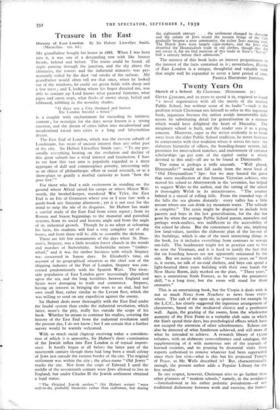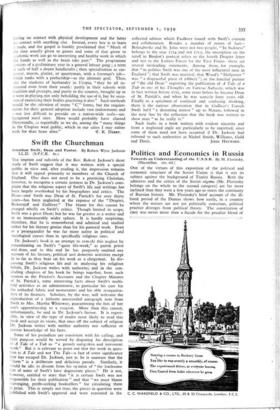Twenty Years On
Sketch of a School. By Cheironax. (Heinemann. 5s.)
GIVEN L250,000, and zo years to spend it in, required to found " a novel organisation with all the merits of the modern Public School, but without some of its faults "—such is the problem which Cheironax sets himself to solve in this ingenious book, ingenious because the author avoids innumerable dull- nesses by substituting detail for generalisation in a manner which would have delighted the heart of Macaulay. The imaginary school is built, and the reader sees it as a going concern. Moreover, eager as the writer evidently is to break away from the older Public School tradition, he never hesitates to compromise with that tradition where it serves his turn: the elaborate hierarchy of offices, the boarding-house system, full provision for inter-school matches, and endowment of entrance scholarships (4o per cent. of the capital outlay is wisely devoted to this end)—all are to be found at Dimynunlle.
The name is perhaps a trifle uncouth. " Well played, Dimynunlle l" would not fall easily from the most loyal of " Old Dimynunllean " lips: but we may hazard the guess that some recollection of that famous Victorian oekistes, who moved his school to Aberystwyth in the 'seventies, has helped to suggest Wales to the author, and the setting of the school is thoroughly Welsh in its attractiveness. " The country behind is a massif of rolling hills. From the rounded tops of the hills the sea gleams distantly : every valley has a little stream where one can drink icy mountain water. The solitude is complete." The cynic might be disposed to include both parents and boys in the last generalisation, for the day has gone by when the average Public School parent, motorless and perhaps week-endless, was indifferent to the accessibility of the school he chose. But the remoteness of the site, implying low land-values, justifies the elaborate plan of the lay-out of the buildings, which is one of the most interesting things in the book, for it includes everything from contours to sewage out-falls. The headmaster might not in practice care to live so near the Vivarium, and it is hard to justify the fact that the six boarding houses are not apparently orientated by the sun. But we notice with relief that " twenty years on " there is, it seems, no talk of air-raid shelters, and boys can spend a light-hearted three years building with their own hands the New Music Room, duly marked on the plan. " Three years," says a sententious Sixth Former, as he works the pneumatic drill, " is a long time, but the room will stand for three centuries."
This is an entertaining book, but the Utopia it deals with is not so much News from Nowhere as news from every- where. The cult of the open air, as sponsored for example by the L.C.C., has clearly suggested the ingenious arrangement of classrooms, based on the mediaeval cloister and a penthouse wall. Again, the grading of the rooms, from the wholesome austerity of the First Form to a veritable club suite in which the Sixth spend their days, has psychological effects which have not escaped the attention of other schoolmasters. Echoes can also be detected of what Sanderson achieved, and still more of what he intended to achieve. A research library of 15,000 volumes, with an elaborate cross-reference card catalogue, the supplementing of it with numerous sets of the journals of learned societies, and its pruning by decennial visits from experts authorised to remove whatever had been superseded since their last visit7-what is this but his projected Temple of Peace, as Mr. Wells described it? But, characteristically enough, the present author adds a Popular Library for the less erudite.
In one respect, however, Cheironax tries to go further than other planners of " modern schools," namely, in the avoidance —foreshadowed in his rather pedantic pseudonym—of any traditional dichotomy between work and exercise, the former having no contact with physical development and the latter no contact with anything else. Instead, every boy is to learn a trade, and the gospel is frankly proclaimed that " Much of the time usually given to games and some of that given to academic work can go to interesting and healthy work in which the hands as well as the brain take part." The programme consists of a preliminary year in a general labour gang ; a term at each of half a dozen handicrafts ; then specialisation as car- penter, mason, glazier, or quarryman, with a foreman's job— which ranks with a prefectship—as the ultimate goal. Thus, like the students of husbandry in Utopia, " they be all in- structed even from their youth: partly in their schools with tradition and precepts, and partly in the country, brought up as it were in playing, not only beholding the use of it, but by occa- sion of exercising their bodies practising it also." Such methods would be the salvation of many " C " forms, but the require- ments for their general adoption include vast endowments and —not less difficult to provide on a nation-wide scale—un- hampered rural sites. More would probably have classed Dimynunlle, as regretfully as we do, among the " many things in the Utopian weal public, which in our cities I may rather



































 Previous page
Previous page